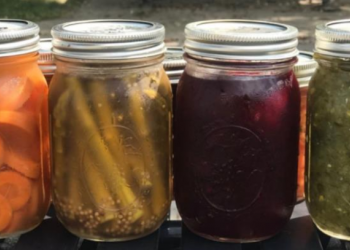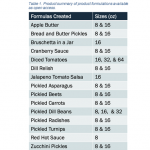Producing shelf-stable acidified canned foods can help to add value to produce and introduce new markets, extend the agricultural season, and reduce waste. However, to successfully sell and distribute shelf-stable products, such as salsas, sauces, and/or acidified pickled products, processors must comply with the Code of Federal Regulations (21CFR114). This project provides open-access to the development of 12 shelf-stable acidified canned food recipes that were converted into scale-appropriate product formulations that includes the scheduled process that identifies the appropriate food safety controls that were approved by a Process Authority.
Project Goals and Objectives:
The overall goal of this project is to increase the production of specialty crops through value-added production. To achieve this goal, we focus on 3 objectives:
- Objective 1: Identify and develop 12 shelf-stable products that optimize the use of specialty crops to increase utilization, reduce waste and extend the agricultural season of specialty crops that grow well in the Massachusetts climate zone.
- Objective 2: Validate the product formulations to ensure that the proper process controls and regulatory compliance are regulatory compliant to meet the proper food safety parameters utilizing scale appropriate process controlsoriented to small scale production.
- Objective 3: Extension Education and Evaluation; Research outcomes identified from this project willbe translated for use by stakeholders through a variety of extension activities.
Relevance:
This work provides thenecessary technical support to manufacture safe quality products that will increase the usage of specialty crops, enable season extension for growers and reduce the overall waste of produce
Outputs and Extension Publications:
- Recording of Acidified CannedFood Webinar (hosted by NECAFS) -https://www.uvm.edu/extension/necafs/past_webinars
- Slides presented from the Acidified Canned Food program - MDAR Project Slides
- Access to open-access product formulations and can be provided by submitting the attached request form.
This information is made available to processors that are operating in a commercial kitchen. Please note: We strongly encourage all processors review 21CFR114, the acidified foods regulation before the commercial production. The regulation requires that all operators have completed the appropriate processtraining and your facility files the schedule process to the FDA.
Program Support:
The funding to conduct this work was supported through the Massachusetts Department of Agriculture through the USDA Specialty Crop Block Grant Program (SCBGP) (AGR-SC-2016)
Acknowledgements:
We gratefully acknowledge theresources,expertise and engagement contributed by:
- MA Department of Agriculture
- Franklin County Community Development Center, Food Processing Center
- Commonwealth Kitchen
- UMASS Food Science Department
- UMASS Experimentation Station
- UMASS Honors College Program

